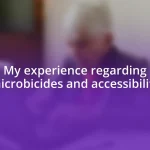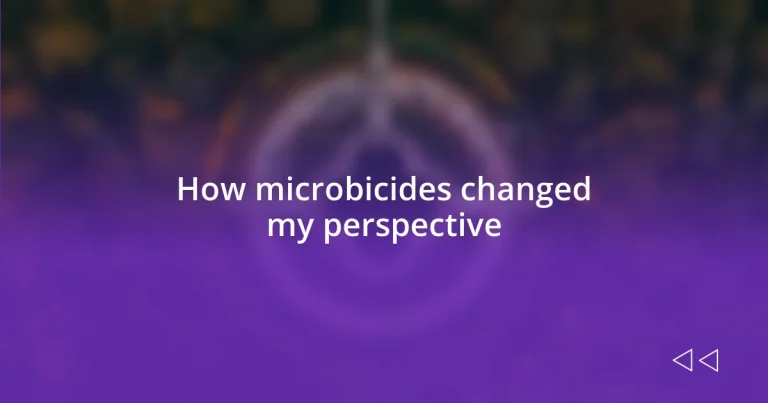Key takeaways:
- Microbicides empower individuals, particularly women, by offering greater control over sexual health, facilitating open discussions, and challenging traditional narratives.
- Education and awareness are essential for overcoming stigma and ensuring access to microbicides, fostering informed choices within communities.
- The future of microbicides may involve personalized options and integration into routine healthcare, normalizing conversations around sexual health and enhancing overall well-being.
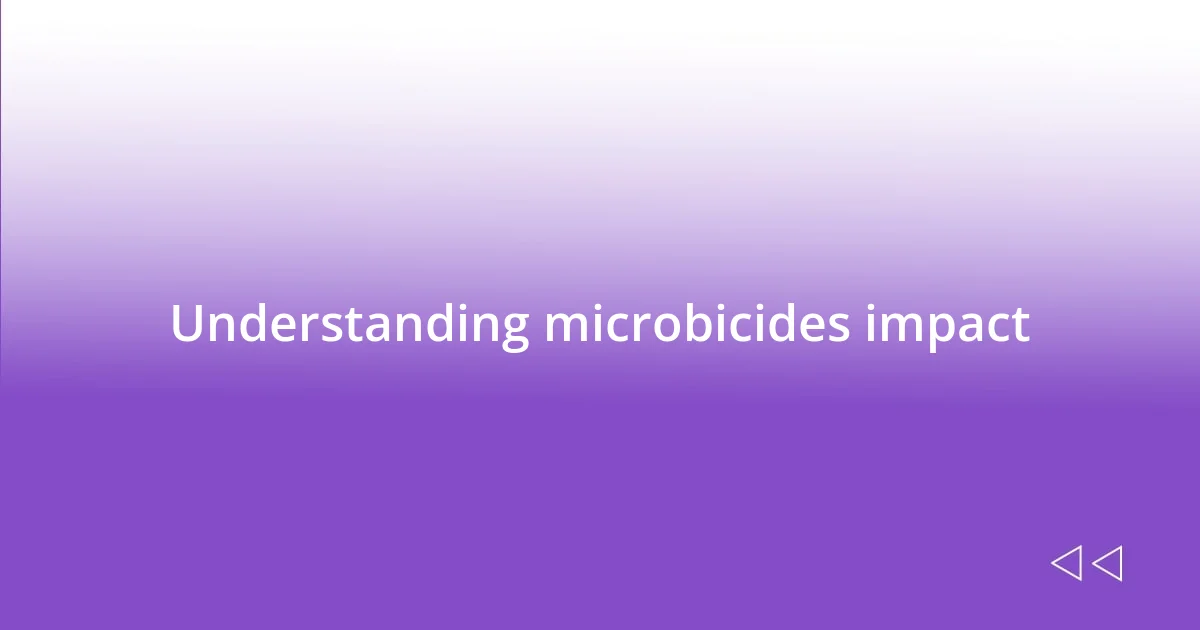
Understanding microbicides impact
Microbicides have truly shifted my perspective on sexual health. Initially, I saw condoms as the only form of protection, but learning about microbicides opened my eyes to a broader array of options. I often wondered why we hadn’t embraced these alternatives sooner, especially when I realized that they empower people, particularly women, to take control of their sexual health.
One moment stands out in my journey: attending a workshop where a speaker shared her experience with microbicides. Her enthusiasm was contagious, and I could feel the hope in the room. It made me reflect on how essential it is to break the stigma surrounding women’s health choices and to provide a safe space for conversations about options that can prevent HIV transmission.
Understanding the impact of microbicides goes beyond statistics; it taps into the emotional realm of autonomy and empowerment. How often do we find ourselves feeling vulnerable or ill-informed about our health decisions? With microbicides, I felt more equipped to navigate my choices. It’s a game-changer that challenges traditional narratives and encourages individuals to embrace their agency in environments where they may feel powerless.
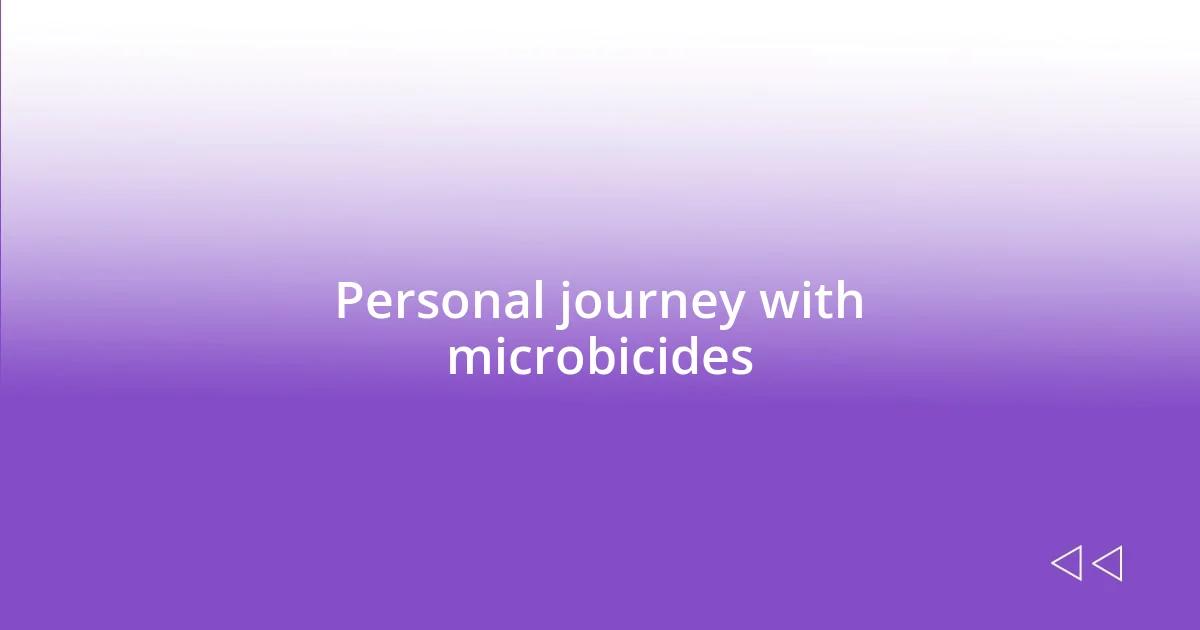
Personal journey with microbicides
My personal journey with microbicides has been nothing short of eye-opening. I remember the first time I picked up a pamphlet on them at a health clinic. It felt almost revolutionary, like discovering a secret door to better health. The concept that microbicides could be used by women as an additional protective measure really resonated with me. It made me realize that the conversation around sexual health is evolving, and I was excited to be part of that change.
As I continued to explore different microbicide options, I found myself having more open conversations with friends. I can vividly recall one evening, sitting on a couch with my best friend, sharing our fears and ambitions. We both expressed how traditional narratives had limited our understanding of sexual health. Learning about microbicides not only equipped us with knowledge but also fostered a sense of empowerment among us. It was liberating to feel like we were taking back control over our bodies and choices.
With each new piece of information, I felt layers of stigma being stripped away. I often found myself thinking about how these advancements could shape future generations’ perspectives on sexual health. What if young women could grow up in a world where they knew their options and felt confident discussing them? I realized that my journey with microbicides was not just about personal health; it was about contributing to a broader dialogue that champions autonomy and informed choices for all.
| Aspects | Traditional Protection | Microbicides |
|---|---|---|
| Empowerment | Limited Agency | Greater Control |
| Conversations | Taboo Discussions | Open Dialogue |
| Health Choices | Constrained Options | Diverse Alternatives |
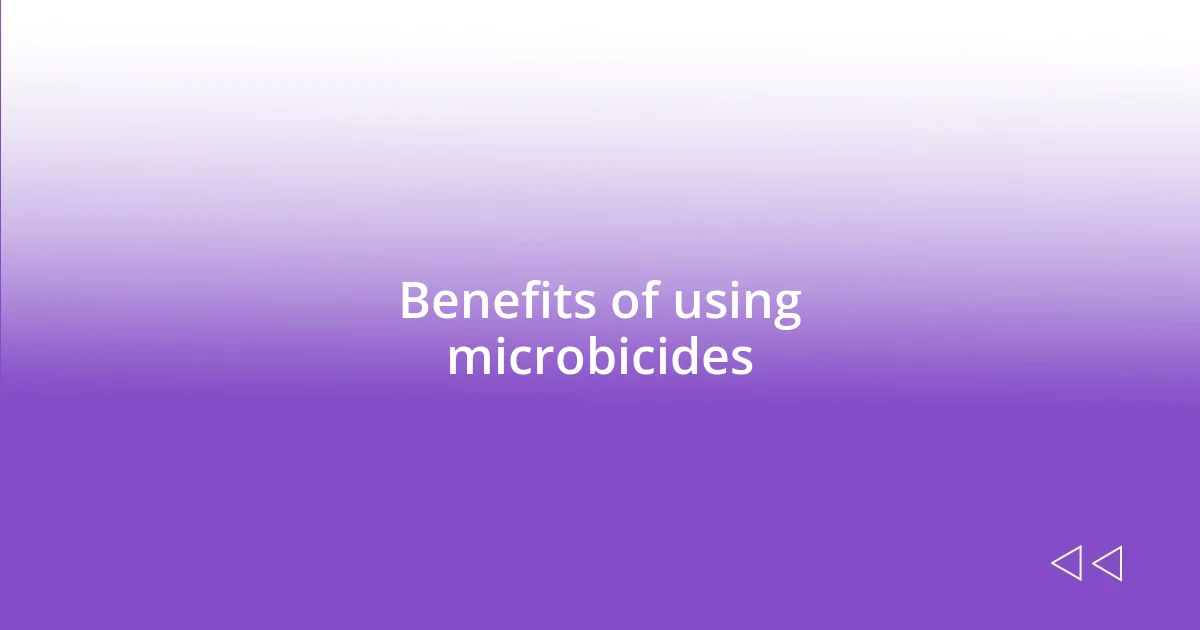
Benefits of using microbicides
I’ve come to appreciate the multifaceted benefits that microbicides offer, particularly in enhancing sexual health. One of the standout advantages for me is the ability to address specific populations, especially women. When I first learned about the variety of microbicides available, I felt a wave of relief knowing that more options were tailored to empower individuals. Instead of feeling constrained by traditional methods, I realized these innovations could help create a more inclusive conversation about intimate health.
Some benefits of using microbicides include:
- Increased Autonomy: They allow individuals to take charge of their sexual health, especially in situations where negotiating condom use can be challenging.
- Variety of Choices: Microbicides come in different forms—gels, films, and more—catering to personal preferences and needs.
- Potential for Dual Protection: Some formulations not only prevent HIV transmission but also offer protection against other sexually transmitted infections (STIs).
- User-Controlled Prevention: They empower users to take proactive measures in their sexual encounters, fostering a sense of confidence.
- Reduced Stigma: By promoting open discussions about different protection methods, microbicides help dismantle lingering taboos around sexual health.
Reflecting on my experiences with learning about microbicides, I remember a gathering where I shared my newfound knowledge with a group of friends. It was refreshing to see their faces light up with curiosity rather than awkwardness. We discussed how microbicides could be integrated into our lives, and there was a palpable shift in the room—conversations flowed seamlessly, and the energy was electric. I felt that spark, an emotional connection to the empowerment that came with knowledge. In that moment, it struck me just how essential it is to normalize these conversations, encouraging everyone to explore their options and take control of their sexual health.
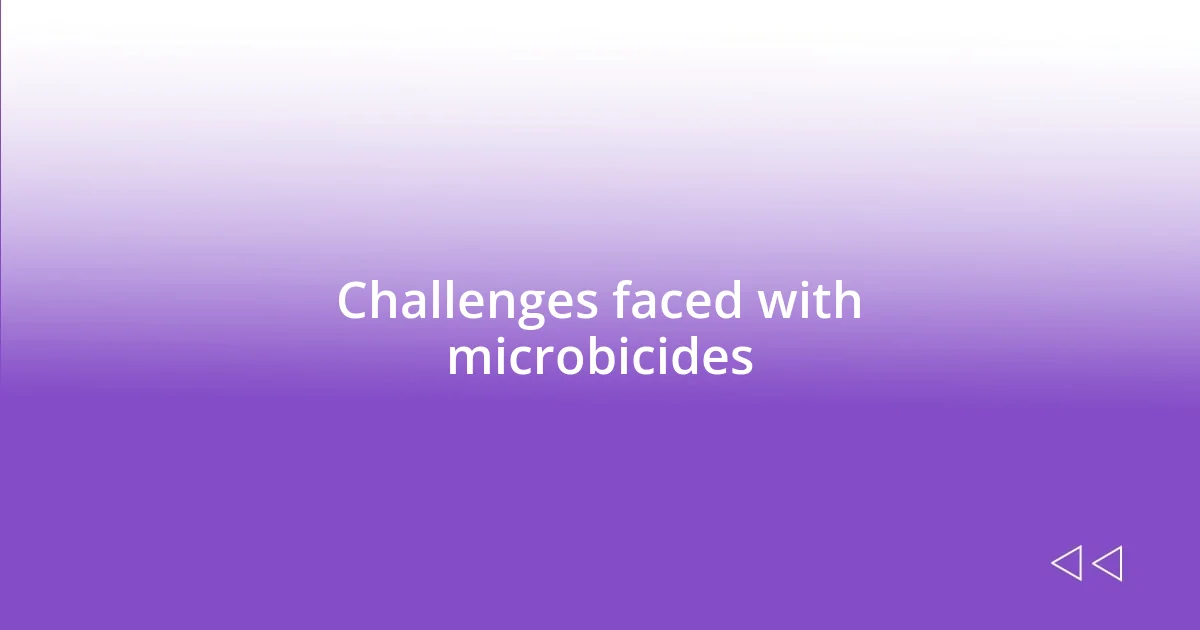
Challenges faced with microbicides
Navigating the world of microbicides hasn’t been without its hurdles. One of the most pressing challenges I encountered was the stigma that still surrounds discussions about sexual health. I remember attending a panel discussion where the topic of microbicides came up, and it was almost palpable—the room went silent. No one seemed ready to tackle the conversation, and it made me wonder: why are we still hesitant to discuss these empowering tools openly? It’s frustrating how societal norms can stifle such important dialogues.
Another significant obstacle I faced was the varying levels of access to microbicides. While some communities have ample resources and awareness, others struggle with basic information. Once, during a community health fair, I met a woman who had never heard of microbicides. She expressed a genuine interest but felt overwhelmed by the healthcare system. It struck me then that education and information dissemination are critical in ensuring everyone can benefit from these innovations. How can we change that dynamic?
Lastly, I realized that personal preferences play a huge role in the acceptance of microbicides. While one formulation might resonate with me, it may not appeal to someone else. I distinctly remember my attempt to encourage a close friend to explore a new microbicide option. Though I was enthusiastic, she was cautious, preferring methods she was more familiar with. It’s a reminder that bridging personal choices and innovative solutions requires patience and understanding. How can we effectively tailor these discussions to cater to diverse preferences? The journey towards broader acceptance is undoubtedly a challenge, but it’s one worth pursuing.

Changing perceptions through education
Education plays a vital role in redefining our understanding of microbicides and their essential benefits. I vividly remember a webinar I attended, where experts articulated the science behind these products with such passion. Their enthusiasm was contagious, sparking my curiosity and inviting me to take a deeper dive into the subject. At that moment, I felt empowered, realizing that education could illuminate the misconceptions I had held. Isn’t it intriguing how knowledge can reshape our sentiments about something that seemed daunting before?
During my journey of learning, I discovered that conversations about microbicides extend beyond mere facts; they touch on experiences and emotions. I once led a small discussion group where we all shared personal stories related to sexual health and protection. As we opened up, the hesitancy melted away, replaced by a camaraderie that I had never anticipated. It struck me then how education fosters a safe space for dialogue. Isn’t it amazing how sharing creates bonds and erases stigma, turning a topic that once felt taboo into a rich resource for empowerment?
Reflecting on this, I’ve often wondered why certain vital conversations are relegated to the shadows. A few weeks ago, I engaged with a colleague who, surprisingly, had never heard of microbicides despite her health background. After sharing some insights, she expressed disbelief that such solutions even existed! Her reaction was an eye-opener for me, highlighting gaps in awareness and knowledge. It made me realize that we need to advocate for continued education more than ever. How can we foster an environment where everyone feels informed and emboldened to make choices that can significantly impact their health?
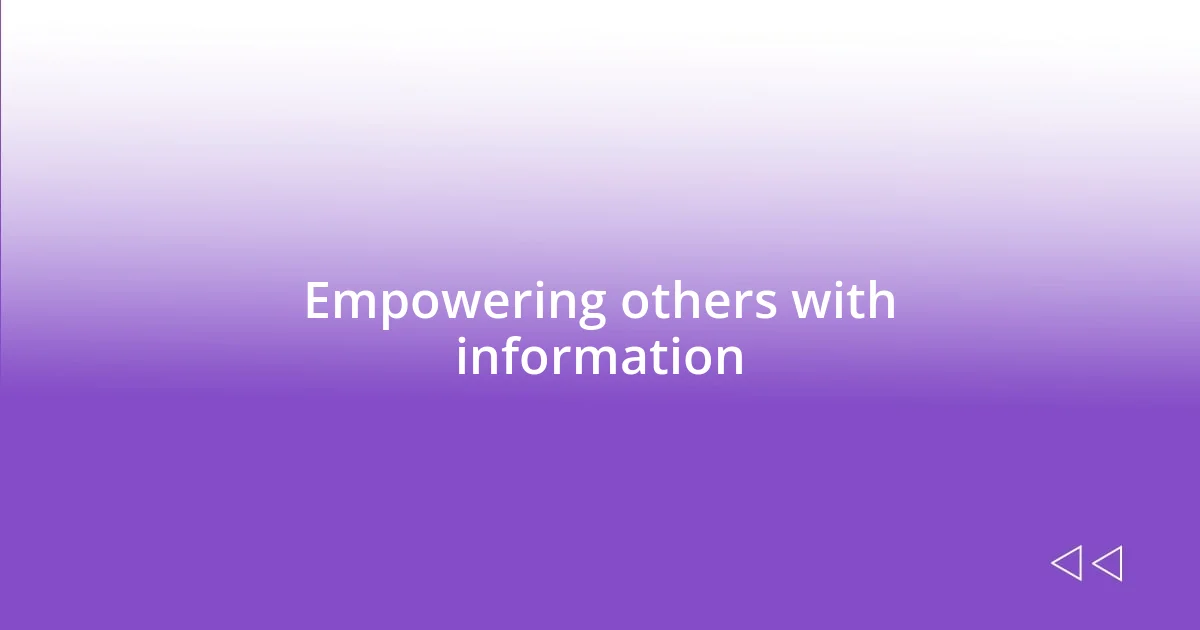
Empowering others with information
Empowering others with information is something I’m deeply passionate about. I recall a time when I hosted an informal gathering with friends to discuss microbicides. As the conversation unfolded, I saw the initial apprehension on their faces transform into genuine curiosity. It was heartwarming to witness how sharing accurate information shifted their perspectives. I wondered, how many others might feel the same way if we created spaces for open discussion?
In another instance, I volunteered at a local health initiative aimed at educating underserved communities about microbicides. I vividly remember a moment when a participant raised her hand and shared how she had felt isolated due to a lack of information. Her vulnerability was striking, and it highlighted the immense power of knowledge. I felt honored to provide her with valuable insights and resources. Isn’t it incredible how a simple conversation can empower someone to feel less alone in their journey?
Ultimately, I’ve come to recognize that information is a catalyst for change. When we take the time to educate ourselves and others, we dismantle barriers and foster understanding. I think back to a mentor who once told me, “Knowledge is the first step toward empowerment.” This insight has always resonated with me, prompting me to ask: how can we better share and amplify crucial knowledge in our communities?
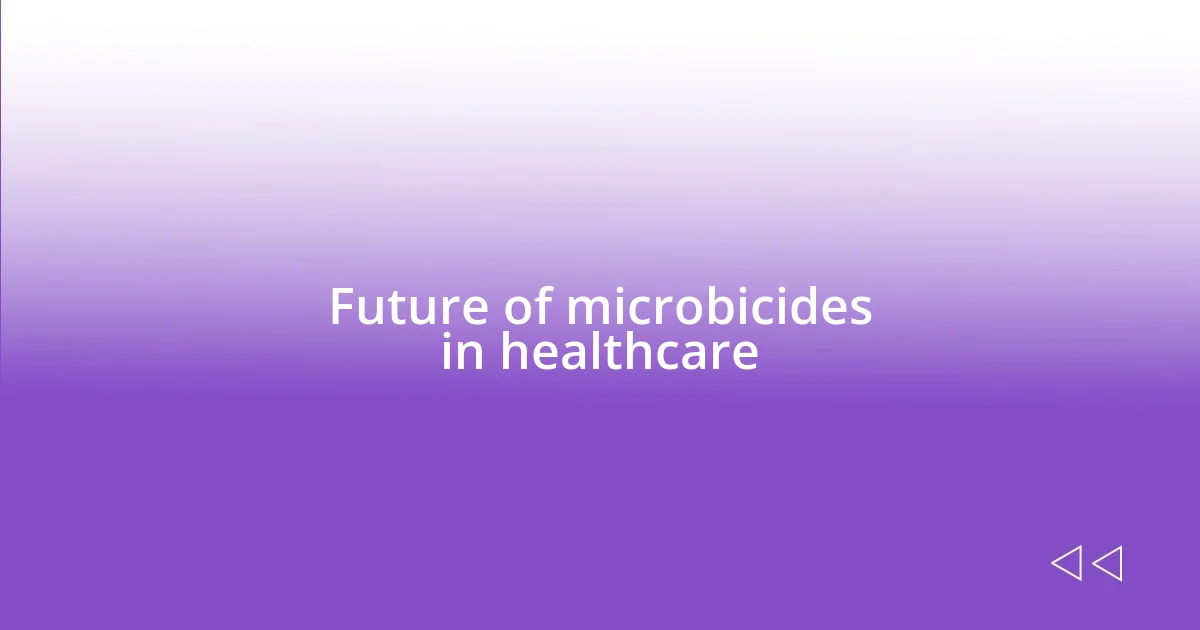
Future of microbicides in healthcare
Future advancements in microbicides offer exciting potential for healthcare. I recently attended a conference where experts discussed innovative formulations that could potentially change the landscape of preventative health. Imagine products that not only prevent sexually transmitted infections (STIs) but also provide additional benefits like enhancing vaginal health! It made me think—how often do we overlook the holistic impact that such solutions could have on women’s well-being?
As research evolves, the future may even see personalized microbicide options tailored to individual needs. I’ve often found myself reflecting on how empowering it would feel to choose a product that aligns with my specific health goals. It raises the question: how can personalization in microbicides influence our everyday choices regarding reproductive health?
It’s fascinating to envision a future where microbicides are integrated seamlessly into routine healthcare. Picture a world where during regular check-ups, healthcare providers discuss microbicides as a standard part of health education. Such an approach could normalize conversations about sexual health, breaking down barriers that still exist today. Don’t you think that would create a much more open and informed society?


